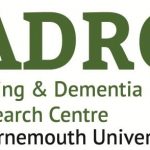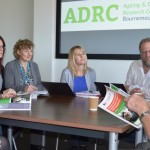
Dr Michele Board, Professor Jane Murphy, with students Laura Wade, Neil Reid and Abigayle Travers Bu research assistant Rebecca Mitchell, with the team from Alzheimer’s Research UK

Rebecca Mitchell, Year 2 adult nursing students Laura Wade, Abigayle Travers and Neil Reid
A new training resource, launched yesterday (11 June) by Alzheimer’s Research UK and Bournemouth University, uses virtual reality to help healthcare professionals improve their understanding of the symptoms and challenges of dementia, and to help them develop enhanced relationships with people with the condition.
The Lived Experience of Dementia aims to enhance empathy and increase understanding of the lesser-known symptoms of dementia by enabling healthcare professionals to experience the everyday challenges faced by people living with the condition through innovative VR technology. From today, the first 1,000 training packs will be free to order from the charity’s website.
The resource is built around Alzheimer’s Research UK’s groundbreaking A Walk Through Dementia virtual reality app. The free app uses computer-generated environments and 360° video sequences to illustrate in powerful detail the symptoms and difficulties faced by people with dementia.
The Lived Experience of Dementia was developed following a comprehensive evaluation of the A Walk Through Dementia app as a training tool at Bournemouth University’s Ageing and Dementia Research Centre with nursing home staff and undergraduate students including physiotherapy, occupational therapy and adult, child, and mental health nursing students.
The evaluation showed that 81% of users said the app had challenged their perceptions of dementia and 92% had a greater insight into the challenges faced by people with dementia after using it. When asked, 93% of those who tested the app as part of the evaluation said they would recommend it to health and social care staff and family members of people with dementia.
After an introduction to a humanised approach to care, the training pack asks the user to undertake the VR app to follow Anne, who has dementia, as she goes shopping, walks back from the supermarket and makes a cup of tea at home. Each scenario links the challenges Anne faces to the user’s experiences in their working life, enabling them to reflect on how they can apply this insight when interacting with, and caring for, people with dementia.
The resource also incorporates commentary from people with dementia and their carers, including suggestions on the small changes healthcare professionals can make to enhance the care they provide.
The Lived Experience of Dementia is suitable for anyone who provides front-line care in an acute hospital, in the community or in a residential home setting, and covers a range of learning outcomes from the Dementia Training Standards Framework, supporting other learning materials covering Tier 2 standards.
Hilary Evans, Chief Executive of Alzheimer’s Research UK, said:
“With more than 850,000 people in the UK living with dementia and this number set to rise dramatically in coming years, we must do all we can to support those working on the front line of healthcare.
“The Lived Experience of Dementia is a uniquely powerful training tool, using innovative virtual reality approaches to give people first-hand experience of some of the challenges that those living with dementia face every day. Our aim is to harness this technology to provide a low-cost way for formal and informal carers to develop their own skills and widen their perspective of the complex experience of dementia.
“This has been a truly special project for us and we’re hugely grateful to our supporters whose experiences inspired the development of this important resource.”
Dr. Michele Board, Deputy Lead Ageing and Dementia Research Centre (ADRC) at Bournemouth University, said:
“When we first saw Alzheimer’s Research UK’s virtual reality dementia app, we were struck by its potential to drive more empathy than traditional training approaches. Our evaluation work shows that the VR approach leaves a lasting impact on learners and saw many users refer to their experiences in the app when faced with similar situations in their day-to-day work.
“People with dementia often find it difficult to communicate what they’re experiencing or how they need help. It’s only through truly stepping into someone’s shoes that you can develop really human-centred approaches to care. We hope this training tool will support healthcare professionals in their personal and professional development.”
Trina, living with posterior cortical atrophy – a rare form of Alzheimer’s disease – who fed into the development of the app and the training resource, said:
“When some people think about dementia they just think about memory problems, but it also affects people in lots of other ways. I’m delighted that my experiences and the experiences of people living with other forms of dementia have been used to develop this resource.
“We must talk about dementia more and do all we can to help people understand it.”
Attending the launch in London from BU were Dr Michele Board and Professor Jane Murphy; Rebecca Mitchell Research Assistant and 3 adult nursing students, Abigayle Travers, Laura Wade and Neil Reid. The students have participated in the evaluation, development of the workbook and support delivery of the training to other students, their active involvement throughout the project has been brilliant!
The Lived Experience of Dementia training packs, containing the workbook and virtual reality headset, can be ordered by visiting alzres.uk/lived-experience-dementia
The first 1,000 packs are free thanks to funding from Legal & General, a long-standing corporate partner of Alzheimer’s Research UK.

Drinks reception in London at the Launch of the workbook funded by legal and general

Workbook developed by BU to support the AWTD app

Undergraduate students in Kimmeridge Lecture Theatre viewing the AWTD app
 Ageing and Dementia Research Centre (ADRC) at Royal College of Physicians – launch of Electronic workbook for Nutrition and Dementia care
Ageing and Dementia Research Centre (ADRC) at Royal College of Physicians – launch of Electronic workbook for Nutrition and Dementia care New Ageing & Dementia Research Centre opens for business
New Ageing & Dementia Research Centre opens for business










 Dr. Ashraf cited on ‘Modest Fashion’ in The Guardian
Dr. Ashraf cited on ‘Modest Fashion’ in The Guardian NIHR-funded research launches website
NIHR-funded research launches website Academics write for newspaper in Nepal
Academics write for newspaper in Nepal MSCA Postdoctoral Fellowships 2025 Call
MSCA Postdoctoral Fellowships 2025 Call ERC Advanced Grant 2025 Webinar
ERC Advanced Grant 2025 Webinar Horizon Europe Work Programme 2025 Published
Horizon Europe Work Programme 2025 Published Horizon Europe 2025 Work Programme pre-Published
Horizon Europe 2025 Work Programme pre-Published Update on UKRO services
Update on UKRO services European research project exploring use of ‘virtual twins’ to better manage metabolic associated fatty liver disease
European research project exploring use of ‘virtual twins’ to better manage metabolic associated fatty liver disease